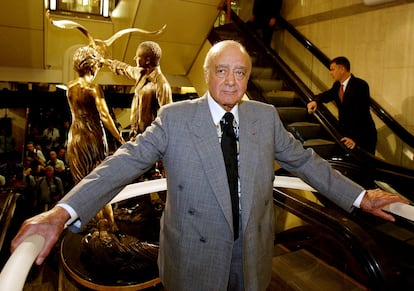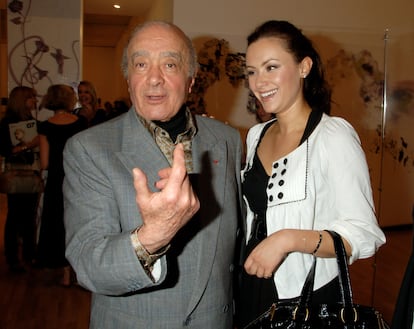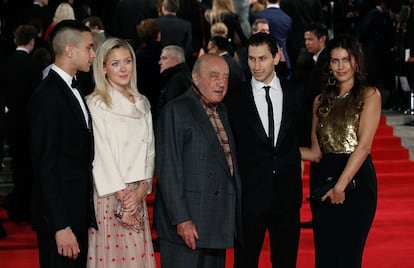The battle for Mohamed Al-Fayed’s inheritance begins
The four children of the recently-deceased Egyptian magnate – who once owned the Harrods department store in London and Fulham F.C. – are at war over his will, which is estimated to be worth around $2 billion

At 74 Westbourne Grove, one of the main streets in London’s sought-after Notting Hill neighborhood, is the vegan restaurant Farmacy. “A wonderful place, lovely staff, horrible, shitty food,” said Marina O’Loughlin in her review for The Guardian newspaper. She was talking about the business project of Camilla Al-Fayed, 38, one of the four descendants of the Egyptian billionaire tycoon Mohamed Al-Fayed, who died at the age of 94 on August 30. The different businesses undertaken by the offspring of the former owner of the Harrods department store, the quintessential symbol of British luxury, have had rather mediocre results, despite receiving a considerable paternal financial injection. The real business project of Jasmine (42 years old), Karim (39), Camilla and Omar (35), two daughters and two sons from the millionaire’s marriage to the Finnish actress and model Heini Wathen (68 years old), consists of taking over the largest portion of the almost 2,000 million euros in which Al-Fayed’s inheritance is estimated.
The British tabloids, always excited when reality tends to surpass fiction, are already talking about a battle in the style of the television series Succession, in which members of the Roy family fight for control of his media empire in the face of doubts about the patriarch’s health. Although it is clear that this story makes more reference to the Murdochs, whose head of the family, Rupert, who announced this week that he is leaving the presidency of Fox and NewsCorp at the age of 94, did have the power and influence in the British society that Al-Fayed could never achieve. What the Egyptian businessman did achieve was amass an immense fortune that he kept until the end of his days.
Upon his death, the family spoke in the official statement of “a beloved father, husband and grandfather, who died peacefully and surrounded by his loved ones.” That peace of the last moments, however, had nothing to do with the previous years, when the British began to know the dirty laundry between the brothers aired by the tabloid press. During the 2020 confinement, the unpleasant legal fight between Camilla and her little brother, Omar, came to light. The youngest of the family, who was one day identified as Al-Fayed's successor at the head of his businesses, decided, however, to go it alone with his company ESTEE, based in Switzerland and the United Kingdom, focused on exploration and colonization of space.

On May 18 of that year, Omar says that his brother-in-law Mohamed Esreb, the Syrian businessman married to Camilla, cornered and beat him during a family gathering at the Surrey country estate, where Al-Fayed has lived in retirement for the last two decades. Omar claimed compensation for damages of more than 120,000 euros. Camilla alleged to the judge that her brother was high during the incident. The judge recommended —almost demanded— that both men reach a private resolution to their confrontation to avoid further public embarrassment and greater financial costs. It is not known if the matter was resolved, but since then Omar has accused his sister of suffering from “middle daughter syndrome” and, without naming her, he has said in an interview that he considers himself the victim of “a struggle of power between brothers.” Camilla, for her part, has accused him of “completely making ridiculous the legacy of their father.”
The other two brothers have preferred to avoid any public comment on that dispute. Jasmine lives a quiet life in Kent, southern England, with her Welsh husband Noah Johnson, a former boxer, former world disco dancing champion and former heavy metal singer, and their daughter. Her attempts to become a businesswoman in the fashion industry failed. Karim, who is profoundly deaf as a result of meningitis he contracted at the age of two, is passionate about photography and runs the Karim Fayen Hearing Centre, a philanthropic organization that offers help to people with hearing problems.

Al-Fayed's fortune
The businessman, owner for a quarter of a century of the legendary London department store Harrods, as well as the Fulham F.C. football club, was a prominent protagonist in British economic and political life and saw his son, Dodi, occupy the front page of the sensational tabloids as a result of his romance with Diana Spencer, Lady Di, by then already divorced from Charles of England. Both died in a car accident in Paris, on August 31, 1997, during a chase in which they were fleeing paparazzi through the streets of the French capital.
In addition to taking over the ownership of the Harrods department store in 1985, in that same year he bought the Ritz hotel in Paris, the Parisian villa where the Duke and Duchess of Windsor (King Edward VIII, who abdicated in favor of his brother) lived during years of exile. George VI, and his wife, the divorced American Wallis Simpson), which was in a serious state of neglect, and an estate in Scotland of more than 26,000 hectares. That year, he also married the mother of his four children. Throughout his life, Al-Fayed also owned luxurious apartments in London's Park Lane and Manhattan in New York; a castle with almost 30,000 hectares of land, up to nine Rolls-Royces and a spectacular art collection.
Fortunately, for their children, who do not share the enthusiasm for maintaining such a heterogeneous business conglomerate, British inheritance law is very favorable to converting the assets of the inheritance into liquid money as soon as possible, to distribute among the heirs and thus avoid eternal conflicts. . Even so, everything anticipates that the war between the Fayed brothers will not be quick or bloodless.
Sign up for our weekly newsletter to get more English-language news coverage from EL PAÍS USA Edition
Tu suscripción se está usando en otro dispositivo
¿Quieres añadir otro usuario a tu suscripción?
Si continúas leyendo en este dispositivo, no se podrá leer en el otro.
FlechaTu suscripción se está usando en otro dispositivo y solo puedes acceder a EL PAÍS desde un dispositivo a la vez.
Si quieres compartir tu cuenta, cambia tu suscripción a la modalidad Premium, así podrás añadir otro usuario. Cada uno accederá con su propia cuenta de email, lo que os permitirá personalizar vuestra experiencia en EL PAÍS.
¿Tienes una suscripción de empresa? Accede aquí para contratar más cuentas.
En el caso de no saber quién está usando tu cuenta, te recomendamos cambiar tu contraseña aquí.
Si decides continuar compartiendo tu cuenta, este mensaje se mostrará en tu dispositivo y en el de la otra persona que está usando tu cuenta de forma indefinida, afectando a tu experiencia de lectura. Puedes consultar aquí los términos y condiciones de la suscripción digital.









































